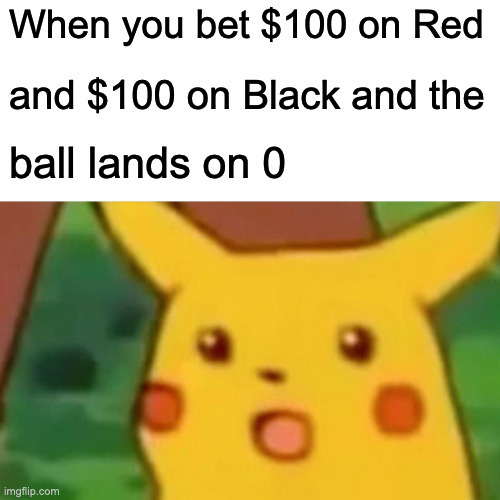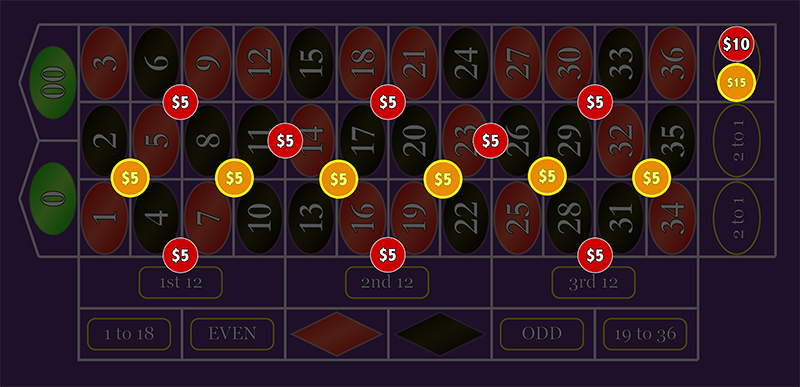
It is often said that the worst thing you can do in Roulette is play the 5-number Top Line bet, but this is absolutely false. There's something you can do that's even worse. You can make combinations of bets that render all your bets WORTHLESS.
What is "Bet Nullification"?
Some people really like to spread their bets around the Roulette table. They don't just make one or two bets covering a small section of the table, they go hog wild, taking up tons of real estate on the felt. They're hedging their bets to increase their chances of getting paid, even though it results in a smaller overall payout.
But if you end up spreading yourself too thin, you can put yourself in a situation where it becomes IMPOSSIBLE to win. This is easy to see if you bet both sides of an even money bet.
For example, you could bet $100 on




But when you hit the



This is a result of Bet Nullification.
If you've never heard this term before, it's because I made it up. I named it this because you're making bets that render your other bets useless or "nullified". Whenever the win from one bet completely cancels out the losses of another bet (or set of bets), there is zero upside to making the bets at all.
And creating a Bet Nullification situation is a mathematical certainty once you hit the threshold of betting on 36 different numbers.
How can we Eliminate Bet Nullification?
The


To figure out how to elimininate the redundant bets, we first want to distribute all multi-number bets into Straight-up bets using the Distributive Property of Roulette Betting.
This is trivial using the Roulette Bet Analyzer I've created. Just enter the bets into the betting layout and look at the numbers in the Equity per Spot section.
After distributing all your multi-number bets into Straight-up bets, you should do the following:
| If you bet on | then you should |
|---|---|
|
36 Numbers |
Identify the lowest amount of equity per spot and subtract it from every Straight-up bet. |
|
37 Numbers |
• Ignore the lowest bet amount. • Identify the lowest amount of the remaining 36 bets and subtract that from the highest 36 Straight-up bets. • After subtracting that amount, repeat this process if you still have equity on 36 numbers. |
|
38 Numbers |
• Ignore the two lowest bet amounts. • Identify the lowest amount of the remaining 36 bets and subtract that from the highest 36 Straight-up bets. • After subtracting that amount, repeat this process if you still have equity on 36 or more numbers. |
|
39 Numbers |
Ask yourself, "Why the Hell am I playing Triple-Zero Roulette?" and shut off your computer. |
Analying the "Diamond Heist" Roulette System
I was watching CEG Dealer School's YouTube channel recently and they were playing a system called "DIAMOND HEIST!" where they made the following bets:

It may not be instantly apparent, but they managed to spread $95 across all 36 Non-zero numbers.
And it's tough to see exactly how much of the $95 is being wasted, but it is A LOT. In fact, $45 of the $95 is cancelling itself out (47.3%!).
Entering these bets into the Roulette Bet Analyzer, we can take a look at how our bets are distributed:

And let's look at the payouts:

 and
and
 .
.
Once we spread the bets out like this, it's easy to see that we're betting $1.25 or more on EVERY NUMBER! This means that we can remove $1.25 per spot without impacting any of the payouts. Multiplying $1.25 by 36, we can see we're wasting $45 of the $95 being bet!
So if we subtract $1.25 from every spot, our total amount bet will be $50 and our bets will look like this:

And what do the payouts look like in our modified system?

 to
to
 section of the layout, but you lose $45 less when you hit
section of the layout, but you lose $45 less when you hit
 and
and
 .
.
So with this betting scheme, EVERY SINGLE PAYOUT IS EXACTLY THE SAME AS THE ORIGINAL SYSTEM - with the
exception of the losses on


So, your expected loss per spin in the improved system is only
If you look at these bets and you're thinking that a casino won't let you bet these fractional amounts
(like $2.08 on


And this makes sense if you understand what bets were removed. We've pulled $15 off the 3rd column and we've taken down $30 in 6 corner bets that makes up the first two columns. Those 6 bets could have been replicated by putting $15 on the 1st column and $15 on the 2nd column. This is possible by applying principles from my post on the Distributive Property of Roulette Betting. After that, getting rid of the $45 of nullified bets becomes trivial.

Always Check your Systems!
So if someone tells you that the 5-number bet is the worst play in Roulette, tell them they're wrong.
Since there is NO chance of coming out ahead with a set of nullified bets, the wagers taken as a whole are essentially worthless. You have risked the locked up bets for ZERO reward.
If you have a system you'd like analyzed or reviewed, make sure that you're not betting on more than 35 numbers at a time. You can run it through the Roulette Bet Analyzer to be certain.
If you find yourself betting on 36 different numbers, just recognize that you've triggered a Bet Nullification situation. Identify the nullified bets and remove them. You'll save yourself a lot of negative Expected Value (EV) with absolutely no downside!
